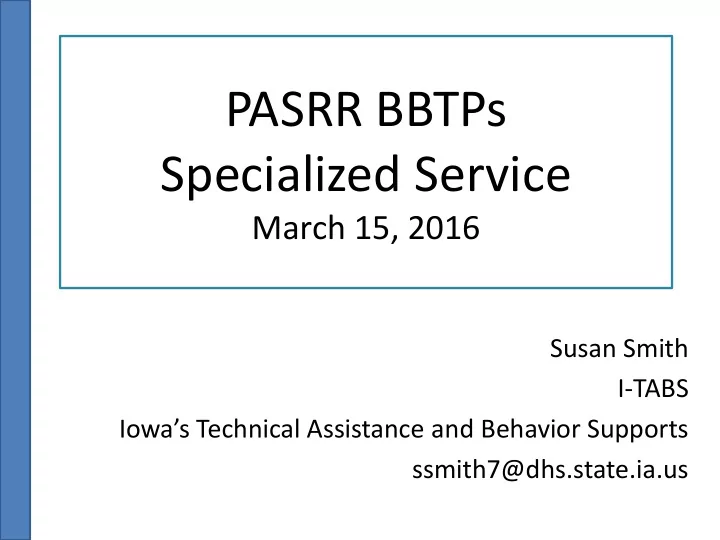

PASRR BBTPs Specialized Service March 15, 2016 Susan Smith I-TABS Iowa’s Technical Assistance and Behavior Supports ssmith7@dhs.state.ia.us
PASRR BBTPs • Values – Ongoing, life-long journeys that are never “completed” • E.g. “….be a loving parent…be valued by others…be as independent as possible…taking good care of my health…being competent, productive, helpful, or creative…be a contributing community/group member….” • Goals- objectives which support the person’s values – Can be deemed “completed” or “not yet completed”. • Behaviors which interfere with the goals/values – Operational definition – Frequency, duration, intensity, history of, etc.
Functional Analysis / Assessment Functional Analysis: – Actual manipulation of variables Descriptive Analysis – Observation of behavior in relation to events that are not systematically arranged Interpret results cautiously; easily biased – Indirect Analysis – Structured interviews, Rating Scales, questionnaires • Interview Tools (examples-there are many) – Functional Assessment Interview Format(FAI; O’Neill, Horner, et al) – Contextual Assessment Inventory (CIA; McAtte, Carr, Schulte) – Functional Assessment Screening Tool (FAST; Iwata) 3
PASRR BBTPs • Hypothesis – Based on functional assessment – Identify antecedent and postcedent variables believed to influence the rate of behavior • “In the past, when ( describe the antecedent condition ), Johnny has engaged in ( name the interfering behavior ) because it resulted in him (chose “acquiring, avoiding, or escaping) ____ ( name the postcedent variable(s) that are the payoff(s) for the behavior(s) ).”
PASRR BBTPs • Treatment Rationale – Explains how treatment strategies are functionally- related to the interfering behaviors • “Now, the probability of Johnny engaging in ( interfering behavior) will decrease because …..(identify the strategies that will be implemented and how they will modify the antecedent and/or postcedent variables identified in the hypothesis)”.
Treatment Rationale Checklist Consider which one, or combination, is relevant and viable: Identify potential antecedent strategies that proactively supply the same • payoff, e.g. how he can get the sensory stimulation. Include antecedent strategies that decrease the value of the payoff, so that his • motivation to get it is reduced. Identify antecedent strategies to get stimulus control on the behavior so that • it continues to occur, but in safe, socially appropriate ways/places/times. --------------------------------------------------------------------------------------------------------------------------------------------------------------------------------------------------------------------------------------------------------- Identify new skills to be taught so that he can ask for or obtain the “payoffs” • in a safe and appropriate manner. Desensitize to items/activities: when avoiding the item/activity long-term • jeopardizes health or the person’s ability to contact reinforcement. --------------------------------------------------------------------------------------------------------------------------------------------------------------------------------------------------------------------------------------------------------- Identify consequence strategies that keep the interfering behavior from • inadvertently being reinforced. Identify strategies/prompts that increase the probability he person will use • skills he is learning during times of crisis. -------------------------------------------------------------------------------------------------------------------------------------------------------------------------------------------------------------------------------------------------------- Other, as needed, based on individual’s needs and resources available. •
PASRR BBTPs • Proactive antecedent-based strategies – Things staff can do to avoid interfering behaviors • Important, as it is always best to provide needed supports rather than wait for the behavior to occur • New skills the person is learning – Which are functionally-related to the behavior of interest
Mindfulness …holds the promise of teaching us to live with what is ….. “We all age, become ill, lose that which is precious to us, and die. How we live with these truths may define the quality of our lives. We can ignore them, deny them, or dance. Lucia McBee • Ability to shift and maintain attention • A move away from avoidance to acceptance • Group/Individual; CDs/tele/online/face-to-face • Accommodations, as needed Populations: depression, anxiety, bipolar, addictive behaviors, personality disorders; older; ID; pain, caregivers, etc.
PASRR BBTPs • Warning signs – Things the person does that signal an “interfering behavior” may be about to occur • What staff should do when warning signs occur • What staff should do when the interfering behavior occurs – Ensure safety – Based on FA results
3 Steps in Validating #3 Validate #1 Gather information “Of course, you • Listen to what the person is saying must be • Watch for nonvocal communication awfully • Pay attention to what is going on in disappointed the environment and a little hurt • Consider the person’s sensitivities right now. Most (biology, past experiences) people would.“ #2 Reflect back to the person for confirmation “Mary told you she doesn’t want you to sit at her bingo table, is that right ? ” 10
Levels of Validation 1. Being present, providing 100% attention 2. Accurate reflection Summarize and repeat what they are saying, using slightly different words – 3. Reading a person’s behavior and guessing what they might be feeling “I’m guessing that comment from your sister was hurtful.” – 4. Understanding the person’s behavior in terms of their history and biology. “Given your experience with ___, I understand why you feel/want___.” – 5. Normalizing or recognizing emotional reactions that anyone would have “Of course you’re feeling___, most people would in your situation….” – 6. Radical genuineness Express support and belief that s/he has the capacity to solve his/her – issues. Retrieved 4/15/15 from: https:// www.psychologytoday.com/blog/partnering-in-mental-health 11
PASRR BBTPs • Data collection system – To evaluate rate of behavior change • Competency-based training – Discussion, model, reverse role-playing • Procedural integrity checks – To ensure program is implemented as written • Data-based decisions – Re-tweak the plan/hypothesis, if data warrants it • Peer reviews – Obtain for treatment resistance cases
Recommend
More recommend